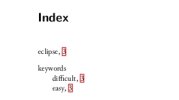Approaching Infinity said:...
Yeah, there are some years that will have something like 50 or more events where we know the year and the (rough) relative sequence, but no exact dates. I'm not sure if the high month option will work, because the sequence needs to be retained for all events, whether the date is known or not.
For example, let's say these 10 (fake) events represent the events in 45 BC:
45 Jan.
45 ?
45 ?
45 ?
45 Mar.
45 Mar 14
45 ?
45 ?
45 Summer
45 Dec
They need to show up exactly in that order. For example, we may know that the "Mar. 45" event happens before the "Mar 14, 45" event, but not know the exact date. And we know the ones without dates happen in this sequence. The trick Jason used was to put a 'sorting field'. So, I could number each event (1-10) and it would sort the events by those numbers. Or, I could number them: 5, 10, 15, 20, 25, 30, etc. That would give room for adding more events in between, and retain a precise sequence. Is that possible using the month option you're thinking of?
Approaching Infinity maybe you could use the "{crossref:T#1828}", which Data suggested above to get rid of duplicates.
Data, I hope this is not a misuse of the crossref thingie.






